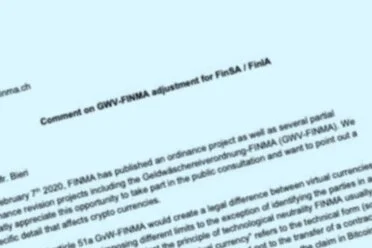The Bank for International Settlement (BIS) has recently published a consultative paper on the Prudential Treatment of Crytpoasset Exposure. Being good citizens, we were happy to follow the BIS’ call for a response to their proposals with constructive feedback that not only points out where they err, but more importantly how some of the proposed principals will prove detrimental to the stability of the financial system they BIS is trying to protect. Never has a proverb being more fitting than this: the path to hell is paved with good intentions.
Comments of Bitcoin Association Switzerland on the draft revised VASP Guidance
The Bitcoin Association Switzerland has sent a comment on the FATF's revised draft guidance on crypto assets. In a consciously "expansive" approach, the FATF proposes to classify participants in decentralized systems as financial intermediaries even if they do not engage in financial intermediation. This would erode the benefits of disintermediation and cause great harm to the nascent sector of Decentralized Finance (DeFi). We criticize this approach and suggest a number of measures to contain the potential damage of imprudent regulation.
Our Comment on the risk assessment for global Stablecoins of the G20‘s Financial Stability Board
Today we sent the following letter to the Financial Stability Board of the G-20 commenting on their risk assessment for "global stablecoins":
Our Comment on GWV-FINMA adjustment for FinSA / FinIA
Our Comment on “Designing a prudential treatment for cryptoassets” of the Basel Committee on Banking Supervision
In December 2019 the Basel Committee on Banking Supervision published a discussion paper on the design of a prudential treatment for crypto-assets and welcomed comments on its analyses and ideas. The comment submitted by the Bitcoin Association Switzerland are the following…
Crypto Valley Association Issues Questionable Recommendations
While the Crypto Valley Association’s paper on “[Asset Tokenization](https://cryptovalley.swiss/wp-content/uploads/CVA-Asset-Tokenization-Paper-final-version-FDU.pdf)” contains many insightful sections, there are other sections that get some fundamental legal considerations embarrassingly wrong. Further questionable is a piece of advice that could make an issued token incompatible with the law. In this blog post, we shed light on the three biggest blunders of the paper.
Our Comment on the Swiss Blockchain Law
In March, the Federal Council presented a draft for a number of legal adjustments and invited Bitcoin Association Switzerland to take part in the public consultation. The consultation phase ends this month and we have filed an extensive comment, in which we support the position of the Swiss Blockchain Federationand lay out some of our common concerns in more detail. In this blog post, I will summarize the content of the proposed law as well as the comments of both Blockchain Federation and Bitcoin Association.
On the Federal Council Report
The federal council published its 170-page report on the legal foundations of the blockchain in Switzerland. It incorporates the findings of the consultation that took place in September and to which the Bitcoin Association also provided some inputs. All in all, it is great that the Swiss government not only recognizes the potential of the blockchain, but also applies the right strategy for allowing the blockchain-ecosystem to flourish.
Is the Ethereum system a legal subject?
There are some hints that abstract systems like Ethereum should legally be treated like their own entities. The latest such hints comes from the context of value-added tax (VAT or MWST in German), where the taxation of transaction fees is practically impossible when trying to find a taxable relationship between miners and users.
Why storing Bitcoins for clients does not make you a bank
Better legal protection for clients of Bitcoin firms coming?
Marcel Dobler, member of the Swiss national parliament and co-founder of digitec.ch, proposed a law that could turn out to be very helpful for Crypto Nation Switzerland. It would give you the right to get your digital assets back in case you have stored them with a provider that goes bankrupt.










